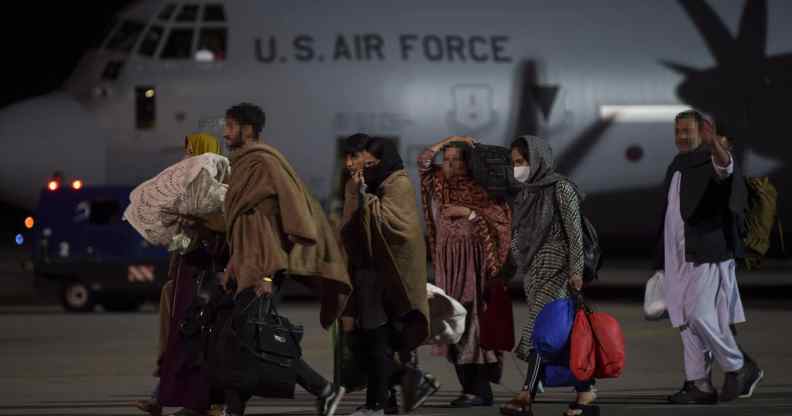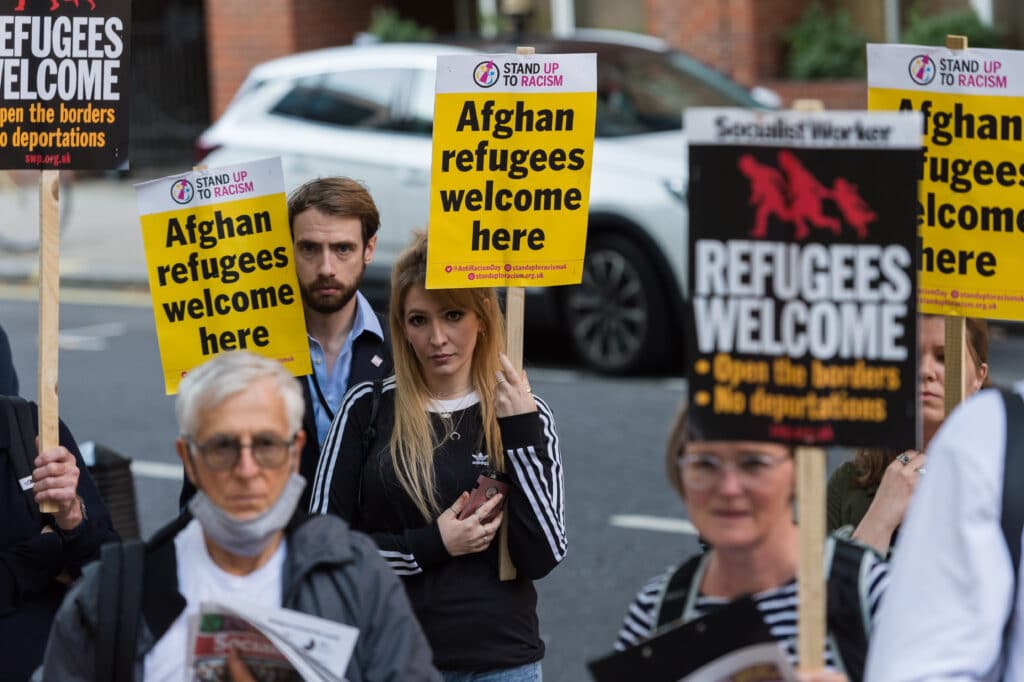LGBT+ Afghans ‘gang raped, attacked and hunted’ amid ‘increasingly desperate situation’

Afghan refugees flee Kabul in August 2021 (ARMEND NIMANI/Getty Images)
LGBT+ Afghans are facing an “increasingly desperate situation” since the Taliban takeover in August 2021, according to a report by Human Rights Watch and OutRight Action International.
The 43-page report, entitled “Even If You Go To The Skies, We’ll Find You”, features interviews from 60 LGBT+ Afghans conducted from October to December 2021, and details horrific instances of threats, violence, and sexual assault.
“It is difficult to overstate how devastating – and terrifying – the return of Taliban rule has been for LGBT Afghans,” said J Lester Feder, senior fellow for emergency research at OutRight Action International.
“We spoke with LGBT Afghans who have survived gang rape, mob attacks, or have been hunted by their own family members who joined the Taliban, and they have no hope that state institutions will protect them.
“For those LGBT people who want to flee the country, there are few good options; most of Afghanistan’s neighbours also criminalise same-sex relations.”
The report interviewed a diverse group within the LGBT+ community, and covered the stories of those who have risked fleeing the country, and those who have had to live under Taliban rule in Afghanistan, with some being forced into mixed-sex marriages.
Many interviewees described the fear of being outed to the Taliban by family, neighbours, or ex-partners.
Samyar V, a 20-year-old trans man, said he had been “hiding in his room for 30 days since the Taliban won control of his city”.
Samyar wanted to flee the country but he had no passport, and getting one would require travelling to Kabul and passing through Taliban checkpoints.
“Even trans people who pass as cisgender could be outed by their ID cards, which would list the gender they were assigned at birth,” the report explained.

Demonstrators in London protest outside the Home Office demanding a safe passage to the UK for Afghan refugees (Wiktor Szymanowicz/Barcroft Media via Getty Images)
Woman’s rights activist Marwa T said she has married her gay male friend – she is herself a lesbian – after she fled her home city when the Taliban ransacked her home.
She told the report: “I was alone. If I continued to stay alone or stay with my friend (my husband now), the Taliban might arrest us, that is why I asked him to prepare a marriage document.”
Several LGBT+ people still living in Afghanistan said that even if they manage to avoid direct violence, they are now unable to earn a living or go out to purchase essentials.
Nihan, a trans woman living in Kabul, said: “I want to emphasise that a lot of queer people have lost their jobs.
“Even if they hide themselves, the problem is they need to feed themselves. They will not go back to the jobs that they had, and there is no other job that they can do.”
The horrific study claims that due to the added oppression against women and girls by the Taliban, several lesbian and bisexual women in Afghanistan “could not safely participate in interviews or said they were too frightened to do so”.
Authors of the report have urged neighbouring countries to keep their borders open to Afghans who are seeking asylum, while governments across the world should “recognise that LGBT Afghans face a special risk of persecution in Afghanistan and neighbouring countries and expedite their applications for evacuation and resettlement.”
The study explained: “Afghanistan will not quickly become safe for LGBT people, given the entrenched violence, discrimination and impunity in Afghan society.
“That means governments of countries where LGBT Afghans seek refugee status should recognise that returning such Afghans home will not be safe for the foreseeable future.”
The study comes as activists have warned that new “anti-refugee” legislation in the UK will make it even harder for LGBT+ Afghans to escape the Taliban.
Proposed by Priti Patel, the supposed purpose of the Nationality and Borders Bill is to “make the asylum system fairer”, “deter illegal entry to the UK” and to “remove people with no right to be in the country”.
It also aims to “introduce new and tougher criminal offences for those attempting to enter the UK illegally”.
Under the new bill, anyone who arrives in the UK by an illegal route – which includes small boats across the Channel – could have their claim ruled as inadmissible, be barred from accessing public funds, and even receive a jail sentence of up to four years.
Leila Zadeh is the executive director of Rainbow Migration, a campaign group that helps LGBT+ Afghans flee. She told the Morning Star that the bill “will criminalise people for trying to seek safety and make it much harder for them to secure refugee status and rebuild their lives in the UK”.

